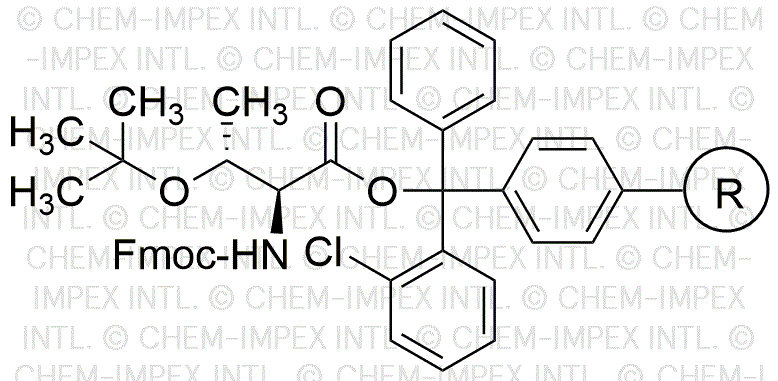Fmoc-O-tert-butyl-L-threonine 2-chlorotrityl resin is widely utilized in research focused on:
- Peptide Synthesis: This resin is essential for solid-phase peptide synthesis, allowing researchers to efficiently create peptides with high purity and yield.
- Drug Development: Its application in synthesizing peptide-based drugs enables the development of therapeutics that target specific biological pathways, enhancing treatment efficacy.
- Bioconjugation: The resin facilitates the attachment of peptides to other biomolecules, aiding in the creation of conjugates for targeted drug delivery systems.
- Protein Engineering: By incorporating this resin in the synthesis process, researchers can modify protein structures, leading to innovations in enzyme design and function.
- Research in Immunology: It is used to produce peptide antigens for vaccine development, contributing to advancements in immunotherapy and disease prevention.
General Information
Properties
Safety and Regulations
Applications
Fmoc-O-tert-butyl-L-threonine 2-chlorotrityl resin is widely utilized in research focused on:
- Peptide Synthesis: This resin is essential for solid-phase peptide synthesis, allowing researchers to efficiently create peptides with high purity and yield.
- Drug Development: Its application in synthesizing peptide-based drugs enables the development of therapeutics that target specific biological pathways, enhancing treatment efficacy.
- Bioconjugation: The resin facilitates the attachment of peptides to other biomolecules, aiding in the creation of conjugates for targeted drug delivery systems.
- Protein Engineering: By incorporating this resin in the synthesis process, researchers can modify protein structures, leading to innovations in enzyme design and function.
- Research in Immunology: It is used to produce peptide antigens for vaccine development, contributing to advancements in immunotherapy and disease prevention.
Documents
Safety Data Sheets (SDS)
The SDS provides comprehensive safety information on handling, storage, and disposal of the product.
Product Specification (PS)
The PS provides a comprehensive breakdown of the product’s properties, including chemical composition, physical state, purity, and storage requirements. It also details acceptable quality ranges and the product's intended applications.
Certificates of Analysis (COA)
Search for Certificates of Analysis (COA) by entering the products Lot Number. Lot and Batch Numbers can be found on a product’s label following the words ‘Lot’ or ‘Batch’.
Número de catálogo
Número de lote/lote
Certificates Of Origin (COO)
This COO confirms the country where the product was manufactured, and also details the materials and components used in it and whether it is derived from natural, synthetic, or other specific sources. This certificate may be required for customs, trade, and regulatory compliance.
Número de catálogo
Número de lote/lote
Safety Data Sheets (SDS)
The SDS provides comprehensive safety information on handling, storage, and disposal of the product.
DownloadProduct Specification (PS)
The PS provides a comprehensive breakdown of the product’s properties, including chemical composition, physical state, purity, and storage requirements. It also details acceptable quality ranges and the product's intended applications.
DownloadCertificates of Analysis (COA)
Search for Certificates of Analysis (COA) by entering the products Lot Number. Lot and Batch Numbers can be found on a product’s label following the words ‘Lot’ or ‘Batch’.
Número de catálogo
Número de lote/lote
Certificates Of Origin (COO)
This COO confirms the country where the product was manufactured, and also details the materials and components used in it and whether it is derived from natural, synthetic, or other specific sources. This certificate may be required for customs, trade, and regulatory compliance.


